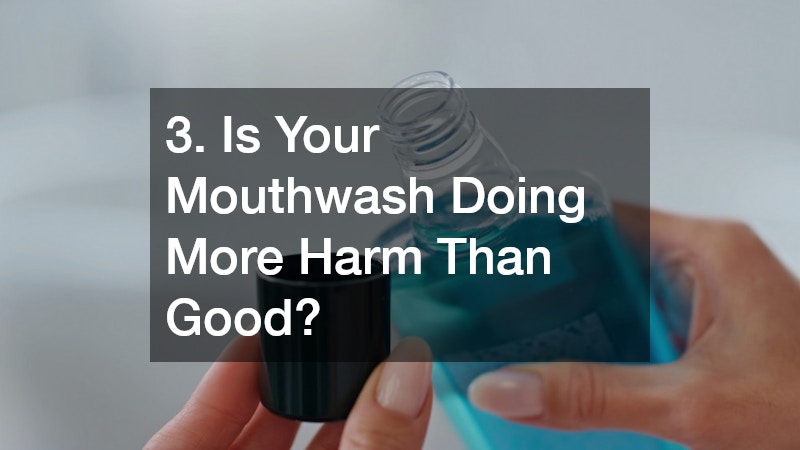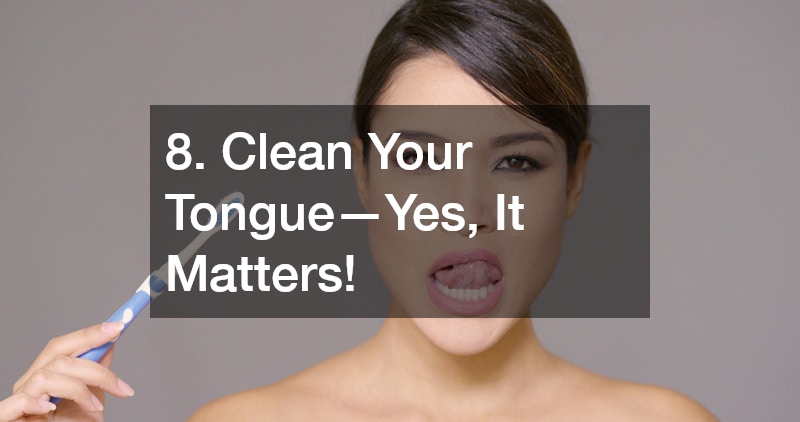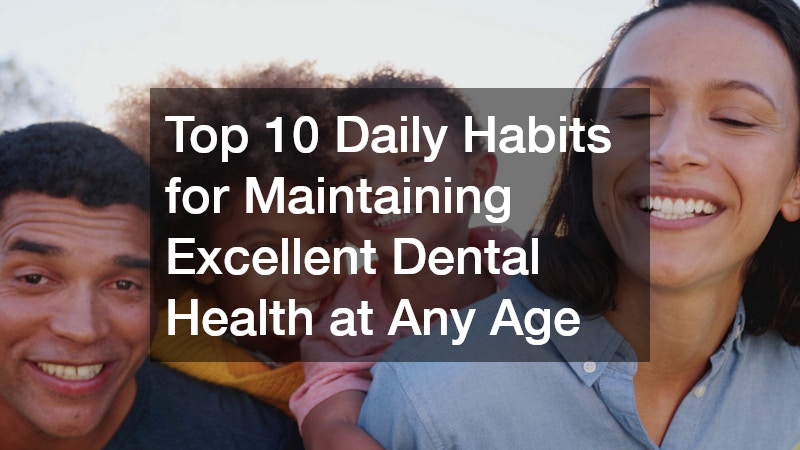
Maintaining excellent dental health is essential—not just for a great smile, but for your overall well-being. Whether you’re a child learning how to brush properly, a teen with braces, an adult juggling responsibilities, or a senior caring for aging teeth, developing the right daily habits is key. Good oral hygiene doesn’t just prevent cavities and gum disease—it’s also linked to heart health, diabetes control, and even cognitive function. The mouth is the gateway to your body, and its health can influence many other systems. The good news? It’s never too early or too late to start.
This article walks you through the top 10 daily dental habits that can help anyone, at any age, achieve and maintain a healthy mouth for life. These simple, practical steps are easy to integrate into your routine and can make a long-term difference in both your dental health and your confidence.
1. Brush Your Teeth Twice a Day—But Are You Doing It Right?
Brushing is the most basic dental habit, but how you do it matters just as much as how often. Many people rush through brushing or use improper techniques that leave plaque behind. Taking just two focused minutes twice a day can make a massive difference in your oral health. Good brushing not only prevents cavities but also reduces your risk of gum disease and bad breath.
Best Practices:
- Brush at least twice a day, ideally after breakfast and before bed.
- Use a soft-bristled toothbrush to avoid damaging gums and enamel.
- Choose a fluoride toothpaste to strengthen tooth enamel and prevent decay.
- Brush for a full two minutes using gentle circular motions.
Tip: Set a timer or play a favorite song to make sure you brush long enough!
2. Don’t Forget to Floss—Daily!
Flossing may seem like a chore, but it’s essential for keeping your mouth healthy. Your toothbrush simply can’t reach between your teeth and under your gums, where food particles and bacteria hide. Flossing once a day clears out these trouble spots, preventing cavities and gum inflammation before they start.
Why Flossing Matters:
- Prevents gum disease and bad breath.
- Reduces the risk of tooth decay between teeth.
- Helps maintain healthy gums, especially important as we age.
If you find traditional floss difficult to use, try floss picks, interdental brushes, or a water flosser.
3. Is Your Mouthwash Doing More Harm Than Good?

Mouthwash can be a great addition to your dental hygiene routine, but not all types are beneficial. While some leave your mouth minty-fresh, they may also contain alcohol or harsh chemicals that dry out your mouth and irritate sensitive tissues. Choosing the right formula can help eliminate bacteria and protect enamel without the downsides.
What to Look for in a Mouthwash:
- Alcohol-free formulas to avoid drying out your mouth.
- Ingredients like fluoride for added cavity protection.
- Natural options with essential oils (like tea tree or peppermint) for gentle antibacterial effects.
Use mouthwash once daily, preferably after brushing and flossing.
4. Stay Hydrated: How Water Supports Your Dental Health
Your body relies on water for everything, and that includes your dental health. Staying hydrated encourages saliva production, which is your mouth’s natural defense system. Saliva neutralizes acids, washes away food debris, and helps prevent bacteria from thriving, making water a powerful ally in your dental care routine.
How Water Helps:
- Rinses away food particles and acid after meals.
- Promotes saliva production, which naturally protects enamel.
- Helps reduce the risk of dry mouth, a condition that can lead to bad breath and decay.
Aim to drink at least 8 glasses of water daily. Choose water over sugary drinks or acidic beverages like soda and fruit juices.
5. Mind Your Diet: What You Eat Affects Your Teeth
What you eat every day has a direct impact on the health of your teeth and gums. A balanced diet that’s low in sugar and high in nutrients can fortify your enamel and keep your gums healthy. On the flip side, frequent snacking on sweets or sipping acidic drinks can erode enamel and cause cavities. Poor nutrition can also weaken your immune system, making it harder for your body to fight off gum infections.
Your saliva plays a key role in protecting your teeth, and it needs a healthy diet to function at its best. Choosing foods that stimulate saliva production, like fibrous fruits and vegetables, can help neutralize acids and wash away harmful bacteria.
Tooth-Friendly Foods:
- Calcium-rich foods: milk, cheese, yogurt, and leafy greens.
- Crunchy fruits and vegetables: apples, carrots, and celery help clean your teeth naturally.
- Green tea: rich in antioxidants and can reduce bacteria.
Foods to Limit:
- Sugary snacks and drinks.
- Sticky candies like gummies and caramels.
- Acidic foods and beverages that erode enamel (e.g., citrus, soda).
A mindful diet is one of the easiest yet most overlooked ways to support your dental health at any age.
6. Chew Sugar-Free Gum—Yes, It Helps!
Believe it or not, chewing sugar-free gum can contribute to a healthier mouth. It helps clear away food debris, boosts saliva production, and freshens breath—all without a toothbrush. It’s especially helpful when you can’t brush after meals, like during work or travel.
Benefits:
- Stimulates saliva production to neutralize acid.
- Helps remove food particles from your teeth.
- Reduces the risk of tooth decay between brushings.
Look for gum with xylitol, a natural sweetener that fights bacteria.
7. Protect Your Teeth During Sports and Sleep
Our teeth aren’t just vulnerable to decay—they’re also at risk of physical trauma. Whether it’s a sports injury or grinding your teeth at night, protection is key. Safeguarding your smile from damage is one of the most overlooked, yet important, parts of daily dental care.
Use:
- Mouthguards for contact sports (football, boxing, hockey).
- Nightguards if you suffer from bruxism (teeth grinding).
Ignoring these issues can lead to chipped teeth, jaw pain, and TMJ disorders.
8. Clean Your Tongue—Yes, It Matters!

Your tongue harbors millions of bacteria, many of which contribute to bad breath, the spread of plaque, and even a dull sense of taste. If you’re brushing and flossing daily but still struggle with persistent odor or a coated tongue, you may be skipping this vital step. Cleaning your tongue only takes a few seconds, but the impact on your oral hygiene and breath freshness is significant.
How to Clean Your Tongue:
- Use a tongue scraper or the back of your toothbrush.
- Stick out your tongue and gently scrape from back to front.
- Clean once or twice a day, especially after brushing.
You’ll notice fresher breath, a cleaner mouth, and even improved taste over time.
9. Keep Your Dental Tools Clean—Are You Overlooking This?
You wouldn’t clean your face with a dirty cloth—so why clean your teeth with a contaminated brush? Keeping your dental tools clean is a small but essential part of your daily routine. It prevents bacterial buildup and ensures you’re not reintroducing germs into your mouth every day.
Tips to Keep Tools Sanitary:
- Rinse toothbrushes thoroughly after use.
- Let them air dry in an upright position.
- Replace your toothbrush every 3–4 months or after an illness.
Avoid sharing toothbrushes—even with family members.
10. See Your Dentist Regularly—Even If Nothing Hurts
Many people wait until they’re in pain before seeing a dentist, but preventative care is the smarter strategy. Routine dental visits help catch problems early, when they’re easier and cheaper to treat. Plus, professional cleanings remove plaque and tartar that daily brushing can’t handle.
This is where dental health experts play a crucial role. From performing thorough cleanings to detecting signs of oral disease, these trained professionals provide personalized advice and treatment tailored to your specific needs. Dental health experts aren’t just there to fix problems—they’re partners in prevention. They can also identify issues that may be linked to other health conditions, such as diabetes, heart disease, or sleep apnea, and guide you on the next steps.
Why Regular Dental Checkups Matter:
- Early detection of cavities, gum disease, and oral cancer.
- Professional cleanings remove tartar that brushing alone can’t.
- Dentists can offer personalized advice based on your age and needs.
Schedule a dental visit every six months—and more often if you’re at higher risk for dental problems.
Bonus Tip: Dental Habits by Age Group
As we age, our dental needs change. Children need guidance, teens face orthodontic challenges, adults juggle stress-related issues, and seniors manage oral health while dealing with aging and medication side effects. Tailoring your daily routine to your life stage ensures lasting oral health.
For Children (0–12):
- Supervise brushing and flossing.
- Use fluoride toothpaste in small amounts.
- Encourage healthy snacking.
For Teens (13–19):
- Manage dental health with braces or retainers.
- Avoid sugary sports drinks and smoking.
For Adults (20–60):
- Stay consistent with brushing and flossing.
- Address stress-related habits like grinding or clenching.
For Seniors (60+):
- Care for dentures or bridges properly.
- Manage dry mouth due to medications.
- Schedule more frequent cleanings if needed.
Final Thoughts: Consistency Is Key
No matter your age, good oral hygiene habits are your best defense against cavities, gum disease, and tooth loss. With just a few minutes a day and some smart lifestyle choices, you can enjoy a healthy smile that lasts a lifetime.
Remember: dental health is a lifelong commitment—but it doesn’t have to be complicated. Start with these top 10 daily habits and give your teeth the care they deserve.
FAQs
Q: How often should I replace my toothbrush?
A: Every 3 to 4 months, or sooner if the bristles are frayed.
Q: What’s the best type of toothpaste for adults?
A: A fluoride toothpaste approved by dental associations (ADA or similar).
Q: Is it normal for gums to bleed when flossing?
A: Mild bleeding can occur if you’re new to flossing, but it should stop after a few days. Persistent bleeding may indicate gum disease—see a dentist.
